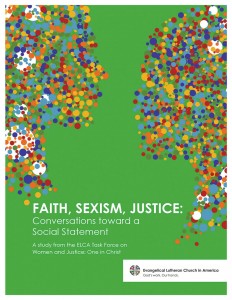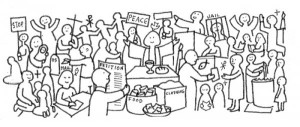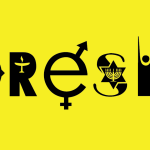As someone who thinks, writes, and teaches about gender justice and religion, I am deeply familiar with the ways that religion is often central to the problem when it comes to sustaining gender injustice. And, despite generations now of women and men doing feminist and anti-racist and queer theologizing, the problems of misogyny, white supremacy, and homophobia remain. In the era of Trump, they are increasingly a threat to our communities, our neighbors, and ourselves.
I’m sure I’ve said it before, and I know I’ve made my case in many ways: Religion can and must be part of the solution or the problems will persist.
 The denomination of which I am a part, the Evangelical Lutheran Church in America, is working toward a renewed social statement on faith, sexism, and justice this year. There are ample resources available to support this work, intellectual as well as practical, some of which are available here.
The denomination of which I am a part, the Evangelical Lutheran Church in America, is working toward a renewed social statement on faith, sexism, and justice this year. There are ample resources available to support this work, intellectual as well as practical, some of which are available here.
The main study resource available for groups and congregations to have conversations about faith, sexism, and justice, is intersectional and provocative. It was produced by a task force of educators and scholars and church leaders guiding the process: “We hope that it will generate honest and empowering conversations about sexism and how it negatively affects individuals and families in our homes, congregations and communities.”
Here are some of its framing questions:
What problems do women face and what does justice require?
How is sexism personal, and how are we the body of Christ together?
What does economic sexism look like, and how can we seek equity for all?
How can we address violence against women and girls?
Why do images and words for God matter?
How do we challenge the misuse of Scripture against women and girls?
Sessions built around these questions end with reflection opportunities as well as specific plans for advocacy. These include:
“Learn about what legal advocates for women, domestic violence workers, immigration advocacy organizations, community organizers or women’s business groups do. Find out the ways you can volunteer in the areas discussed above. Identify women-owned businesses in your area and support them.” (p.44).
“Learn about the laws in your area that marginalize and harm transgender people. Is it legal in your state to discriminate on the basis of gender identity? Contact your legislators …” (p.57)
“Partner with a local agency that works to prevent and respond to gender-based violence.” (p.84)
“Analyze your congregation’s hymnal and other worship resources according to gender. You could also look for the ways the words and images have message about race, ethnicity, age, and ability.” (p.96)
In addition to practical application of the ideas explored in each module, the twin questions are posed: “What is my prayer right here? What action might I take on behalf of the neighbor?”
I often have students examine Dan Erlander’s artwork “Faith Active in Love” to talk about how these things go together … prayer, action, contemplation, protest, sacraments, food justice … expressions of faith and actions toward justice.
Whether you make use of this great resource on connecting faith to struggles against sexism and working toward justice or not, whether you are a part of this denomination or not, these concrete steps are excellent ways to resist and persist.
Now more than ever.











